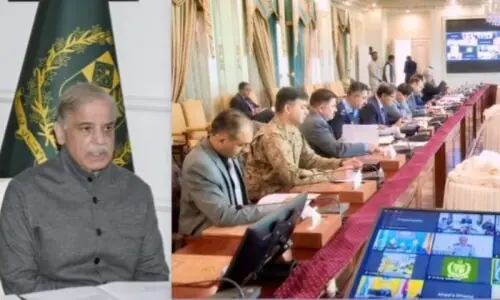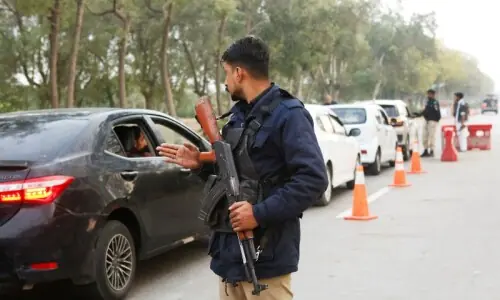We agree to disagree as Muhammad Ilyas Khan always has a case for English being the mainstay of Pakistanis if they wish to get away from the cobwebs of what he terms the ‘ideologues’ who wish to remain unprogressive and static. For them, he points to an article by Gwynne Dyer “The triumph of English”, published in Dawn, last month (May 24), as an eye-opener. The writer argues for the extensive use of English language the world over and makes her case by saying that even though the Italians, Chinese and Arabs will not stop conversing with each other in their own language, they will all speak English to a foreigner.
Yes, that makes English language the most widely used language the world over. Yet, the point for Pakistanis to understand is that people will not stop speaking to each other in their respective languages even though they might know a second language, English.
Sr Marie Cecile Osborne is in agreement that Pakistanis must not revert so quickly to a second language to express themselves and take pride in speaking to each other in their national language, Urdu. The Jesus and Mary Convent schools in Pakistan which she heads have delivered an English medium education to countless girls for the past 135 years. Yet, Sr Marie Cecile is insistent that ‘our’ girls should know and take pride in their national language. To date, Convent of Jesus and Mary schools make their girls take the O-Level Urdu ‘A’ examination, which has both an Urdu literature and language component as opposed to O-Level Urdu ‘B’, which is meant for those who are not Pakistani nationals.
She wants to dispel the impression that Urdu is something second class to English but a lot of the new English medium schools do hold this view and, unfortunately, pass it on to the young generations studying there. She upholds this view by reminding us that language is a very important part of Pakistani culture or any culture worldwide and must be handed down to the coming generations.
This year’s annual play at the Convent of Jesus and Mary was an Urdu play by choice so that the students could take pride in their literary heritage as well. The play “Fehmida ki kahani” by Ashfaq Ahmed was performed last month at Alhamra Hall No 1 to a packed audience. Despite the minimalist set, the powerful emotions evoked by the playwright in the Urdu language were something the audience could empathise with and by the end of it there were many teary-eyed people groping for handkerchiefs in the dark. The social issue laid bare in the play was one typical of our evolving social norms where the exhibition of wealth and its triviality plays havoc with those who cannot afford much and are living a life of bare necessities.
This plays on the sensibilities of young Fehmida who eventually has to give up her life. Her mother, Rahat, holds the uncaring actions of the rich responsible for the death of her daughter and wants to bring a case against them. Rahat’s powerful acting and the use of the language was a runaway success for one so young. Sr Marie Cecile’s wisdom paid off that one can perform at an equally high level in both languages and more so in Urdu because the culture is so familiar.
For most of us in Pakistan the language issue has become an albatross around the necks of the young generations. Schools neglect Urdu because they wish to succeed as an English medium school whereas Urdu medium schools feel inferior because the Urdu language is looked down upon by the elite in the country and suitable conditions for teaching English are not available to them. English is considered the pride and joy of status-conscious people who do not wish to speak to their offspring in Urdu any longer. The anchors on the myriad television channels speak a hybrid of English and Urdu, not realising that however much they try they cannot give up Urdu entirely.
In a study on colonial education in the subcontinent done under the title of Under the Shadow of the Raj (2006), the qualitative interviews of persons educated in English medium schools set up pre-partition is worth mentioning here. One interviewee expressed it by saying, “The most glaring gap was the paucity in knowledge of Urdu and Persian literature. Any Burn Hall boy can quote verbatim to you some if not several passages from Shakespeare or Tennyson or Oliver Goldsmith and enter into a reasonable discussion of the character of Lady Macbeth or Brutus. Yet I had no knowledge of Iqbal or Ghalib or the culture that fostered their writings. Conversely, I knew what the hinterland of Lagos and Durban was like but was not quite aware of the environs of Karachi.”
Another interviewee feels the gap more keenly by noting that “I really missed out on Urdu because there was just not a sufficient emphasis on Urdu and it was certainly not taught in an interesting and inspiring way … subsequently, well, I am a journalist now and I have to read a lot of Urdu text from time to time and interview people who do not speak English. I want to be able to write it the way I can speak it and the way I hear it spoken and the way it is written. I feel that I can’t. I love the poets of Urdu. I love Ghalib, Mir, and Faiz very, very much but it is all self-taught.”
The regret by another interviewee is phenomenal to say the least — “Yes, on reflection I do feel there were a lot of gaps … a whole chunk of Urdu language went missing! Unfortunately not having made a base in early schooling years one has never recovered … a major regret. Well, what to expect when one is fined for speaking Urdu! Yes, no trace of our history too ... In fact a whole culture gone from our lives where our roots are embedded! ... Very sad and almost lethal invasion of human minds.”
Post-partition, Sr Marie Cecile Osborne is adamant that the language and culture of the country be preserved and kept intact for future generations; those who run English medium schools these days are inadvertently squashing the identity and cultural foundations of their country of birth. She is certainly in tune with the changing education paradigms which are being debated across the world as countries are trying to grapple with public education in two contexts. The first is how to educate children to take their place in the economies of the 21st century when that economy is changing every week.
The second is how to educate children to continue with the cultural identity of their communities when the impact of globalisation is becoming more and more inspirational for young minds.
The lesson for all Pakistanis in the education sector is that identity and culture are the mainstays of any people and must be nurtured at all cost.
The writer is an educational consultant based in Lahore































